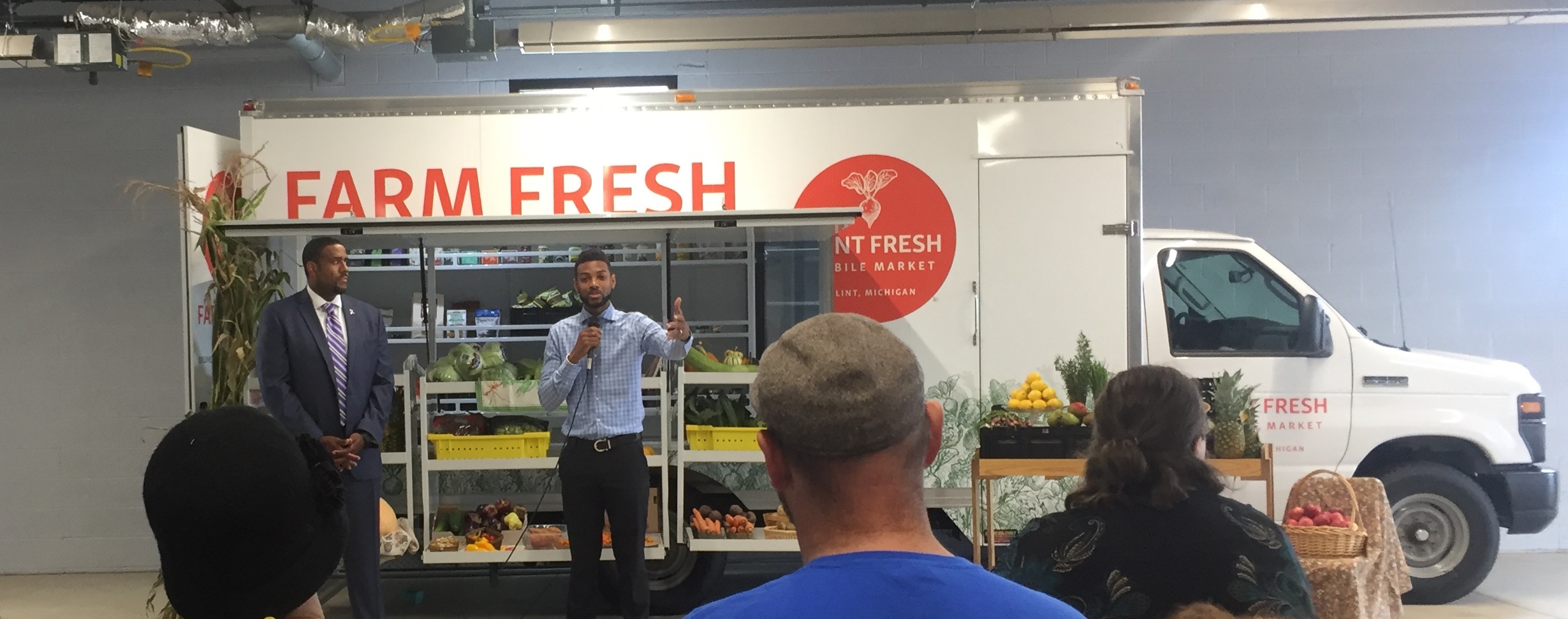The Flint Fresh Food Hub is open for business!
The opening of the Flint Fresh Food Hub, a non-profit, wholesale, local food aggregation and distribution center, marks an important milestone in the local food movement in Flint.

On Sept. 21, 2018, a ribbon cutting ceremony was held at the new Flint Fresh Food Hub and it marked an important milestone in the collective work of improving Flint and Genesee County’s local food economy. On this day, the Food Hub officially opened in a re-purposed building as a state-of-the-art facility for the processing, aggregation and distribution of locally produced food. This wholesale facility has the capacity to bring together produce from multiple local and regional growers/famers to generate the volume required to cost-effectively sell and supply to larger buyers, like schools, hospitals, senior care facilities, restaurants and grocery stores. Additional functions of the food hub include food processing (example: chopping or slicing to create single size servings for schools), food distribution and shipping, and office space for the Food Hub’s seven employees. Each of the Food Hub’s employees have been cross trained to perform all the required jobs in the food hub facility. The initial construction of this facility began in September, 2017.
Flint Fresh is a creative collaboration between five Flint organizations, the Flint Farmers’ Market, the Community Foundation of Greater Flint, the Flint YMCA, the Neighborhood Engagement Hub, and the Local Grocer. Two of Flint Fresh’s innovative food access initiatives, the Flint Fresh Mobile Market and the Flint Fresh Veggie Box subscription program, now located in the Food Hub, offer expanded options for residents and businesses within the city’s limits to conveniently buy locally grown produce for pickup or delivery. The Flint Fresh Mobile Market has been operating in Flint’s neighborhoods since late 2016. It is a nonprofit market that accepts most forms of food assistance benefits, including Double Up Food Bucks and the Michigan Bridge card. Public sites for the Mobile Market include apartment complexes and senior centers to serve clients and employees with chronic health, transportation or food accessibility issues; and employees at organizations like Diplomat Pharmacy; Hurley Medical Center’s Food Farmacy; Consumers Energy and General Motors facilities. The number of sites fluctuates weekly and seasonally from 8 to 15 per week. In 2017, it added the Flint Fresh Veggie Box program, a subscriber-based produce delivery program (to homes and businesses in Flint) aimed at ensuring that more Flint residents have access to fresh food, and that local farmers have access to new markets and sources of revenue. A key partner in this program is the Valley Area Agency on Aging; who provide a consistent high volume demand for the veggie boxes year round. One additional benefit of this program is that it serves as a farmer training and development program as well, as the Food Hub’s farm to fork coordinator guides farmers through required food safety practices (including soil and water testing) and how to harvest at the peak of freshness and flavor to sell to the veggie box program. Flint Fresh Veggie Box program currently has 21 eligible farms contributing; with 11 farmers consistently participating; and has sales of 250-300 boxes per month.

The FFFH key partner-funders. Michigan Department of Education’s Deputy Superintendent Kyle Guerrant (left); and the Community Foundation of Greater Flint’s President Isaiah Oliver (right).
The public health situation in Flint, after years of economic disinvestment, population loss and loss of retail grocers was made worse by the lead in the drinking water crisis from 2014 - 2016, which then highlighted an immediate and increased need for healthy foods to help mitigate lead exposure. Flint’s lead crisis brought to the forefront additional resources and partnerships with numerous state and local organizations working together to give Flint residents a better food system. Although the new healthy food access initiatives that were operationalized during this time period occurred in a relatively short time frame, they were based on plans developed after years of community input, food systems and policy work, and a solid foundation of food access strategies built over the past decade.
Funding for the Flint Fresh Food Hub comes from numerous sources, including the Michigan Health Endowment Fund; Blue Cross/Blue Shield of Michigan; Tides Foundation; Community Foundation of Greater Flint and the Flint Child Health and Development Fund; and the Michigan Department of Education. This food hub is an integral part of the Flint Fresh mission to improve healthy food access for Flint’s residents; increase the capacity of families to take responsibility for their own health; support local farmers and growers; increase the number of local food related businesses; and provide additional jobs in Flint. Participants in the ribbon cutting ceremony were the Michigan Department of Education’s Deputy Superintendent Kyle Guerrant, Community Foundation of Greater Flint’s President Isaiah Oliver, and numerous state and local partner organization’s representatives. Numerous area institutional and retail entities are current customers, with more organizations interested in sourcing produce from the food hub as it expands its capacity to supply these new markets.



 Print
Print Email
Email




